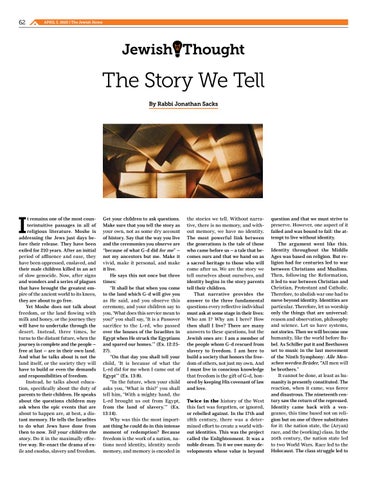62 56
APRIL 3, 2020 | The Jewish Home OCTOBER 29, 2015 | The Jewish Home
Jewish Thought
The Story We Tell By Rabbi Jonathan Sacks
I
t remains one of the most counterintuitive passages in all of religious literature. Moshe is addressing the Jews just days before their release. They have been exiled for 210 years. After an initial period of affluence and ease, they have been oppressed, enslaved, and their male children killed in an act of slow genocide. Now, after signs and wonders and a series of plagues that have brought the greatest empire of the ancient world to its knees, they are about to go free. Yet Moshe does not talk about freedom, or the land flowing with milk and honey, or the journey they will have to undertake through the desert. Instead, three times, he turns to the distant future, when the journey is complete and the people – free at last – are in their own land. And what he talks about is not the land itself, or the society they will have to build or even the demands and responsibilities of freedom. Instead, he talks about education, specifically about the duty of parents to their children. He speaks about the questions children may ask when the epic events that are about to happen are, at best, a distant memory. He tells the Israelites to do what Jews have done from then to now. Tell your children the story. Do it in the maximally effective way. Re-enact the drama of exile and exodus, slavery and freedom.
Get your children to ask questions. Make sure that you tell the story as your own, not as some dry account of history. Say that the way you live and the ceremonies you observe are “because of what G-d did for me” – not my ancestors but me. Make it vivid, make it personal, and make it live. He says this not once but three times: “It shall be that when you come to the land which G-d will give you as He said, and you observe this ceremony, and your children say to you, ‘What does this service mean to you?’ you shall say, ‘It is a Passover sacrifice to the L-rd, who passed over the houses of the Israelites in Egypt when He struck the Egyptians and spared our homes.’” (Ex. 12:2527). “On that day you shall tell your child, ‘It is because of what the L-rd did for me when I came out of Egypt’” (Ex. 13:8). “In the future, when your child asks you, ‘What is this?’ you shall tell him, ‘With a mighty hand, the L-rd brought us out from Egypt, from the land of slavery.’” (Ex. 13:14). Why was this the most important thing he could do in this intense moment of redemption? Because freedom is the work of a nation, nations need identity, identity needs memory, and memory is encoded in
the stories we tell. Without narrative, there is no memory, and without memory, we have no identity. The most powerful link between the generations is the tale of those who came before us – a tale that becomes ours and that we hand on as a sacred heritage to those who will come after us. We are the story we tell ourselves about ourselves, and identity begins in the story parents tell their children. That narrative provides the answer to the three fundamental questions every reflective individual must ask at some stage in their lives: Who am I? Why am I here? How then shall I live? There are many answers to these questions, but the Jewish ones are: I am a member of the people whom G-d rescued from slavery to freedom. I am here to build a society that honors the freedom of others, not just my own. And I must live in conscious knowledge that freedom is the gift of G-d, honored by keeping His covenant of law and love. Twice in the history of the West this fact was forgotten, or ignored, or rebelled against. In the 17th and 18th century, there was a determined effort to create a world without identities. This was the project called the Enlightenment. It was a noble dream. To it we owe many developments whose value is beyond
question and that we must strive to preserve. However, one aspect of it failed and was bound to fail: the attempt to live without identity. The argument went like this. Identity throughout the Middle Ages was based on religion. But religion had for centuries led to war between Christians and Muslims. Then, following the Reformation, it led to war between Christian and Christian, Protestant and Catholic. Therefore, to abolish war one had to move beyond identity. Identities are particular. Therefore, let us worship only the things that are universal: reason and observation, philosophy and science. Let us have systems, not stories. Then we will become one humanity, like the world before Babel. As Schiller put it and Beethoven set to music in the last movement of the Ninth Symphony: Alle Menschen werden Brüder, “All men will be brothers.” It cannot be done, at least as humanity is presently constituted. The reaction, when it came, was fierce and disastrous. The nineteenth century saw the return of the repressed. Identity came back with a vengeance, this time based not on religion but on one of three substitutes for it: the nation state, the (Aryan) race, and the (working) class. In the 20th century, the nation state led to two World Wars. Race led to the Holocaust. The class struggle led to





















